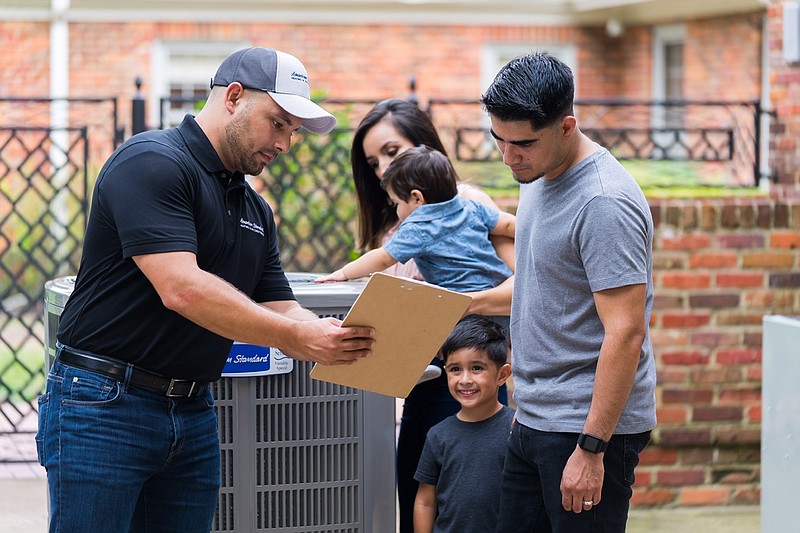I would like the record to show, I was against replacing our heating and air conditioning system. For once, my husband wanted to spend money on a home improvement that I didn't.
I come from the if-it's-not-broken-don't-fix-it school. DC comes from the let's-not-wait-till-it's-a-problem school.
I further blame the HVAC company. (We'll call them Company No. 1.) Last year when a service representative from Company No. 1 came out to see why our system wasn't cooling, he found a slow refrigerant leak. He also took pictures of the inside of our 18-year-old unit, which looked like a mushroom pizza. He did this to scare me.
If we wanted cool air (yes), our choices were to spend $500 to replenish the refrigerant, or spend $13,000 (cough, sputter, hack, sell a kidney) for a new system, or we could buy a Company No. 1 membership for $200, and save half on the cost to replace the refrigerant, and get two free service maintenance calls in the coming year and a discount on future purchases. Swayed by the immediate savings, we bought the membership and replaced the refrigerant.
Then came the phone calls. Company No. 1 kept wanting to schedule a service call. I kept putting them off. Finally, they got through to my (now working from home, thanks to covid-19) husband, who succumbed.
"They are just trolling for business!" I said. A career in journalism has turned me into a bitter skeptic.
"They are doing their job," he said.
And what do you suppose happened? They recommended we replace our old, falling apart, rusty, corroded unit. And guess who took the bait?
DC got an estimate from Company No. 1.
"At least get another estimate," I said.
DC called Company No. 2, who offered a better system for the same price. The new system went in last week. The air in the house feels exactly the same.
To feel better about foregoing vacations for the rest of my life to pay for new machinery, I talked with Kellie Lindenmoyer, furnace product manager for American Standard Heating & Air Conditioning, who cooled me off, and answered these homeowner-related questions:
How often do HVAC systems need replacing?
Typically, systems last 15 to 20 years, especially if serviced regularly.
How do you know whether to repair or replace?
If your system is in that 15-to-20-year range and has recurring problems, it's probably time. Talk to a service pro about your options. Replacing will cost more, but will be better long term because you will save on repairs, and might also see lower energy bills. Some use the $5,000 rule. Multiply the age of your unit in years (say 18) by your estimated repair cost ($300). If your total is more than $5,000, (our example comes to $5,400) then consider replacing your system.
How much can a homeowner expect to pay for a new system?
Depending on the equipment and where you live, estimates for a residential system, including installation, range from $4,600 to $14,000.
When you do spring for a new unit ($$$$ ouch!), what benefits can you expect?
Peace of mind: If you replace your system before it quits working, you won't wake up in February freezing because your system broke in the night.
Lower energy bills: Thanks to regulatory changes, today's systems are more energy efficient. How much you save on your energy bill will depend on your home's insulation, your usage, and how many more "SEERS" your new system has. The higher the SEER (Seasonal Energy Efficiency Ratio) the greater the savings (and the more expensive the unit). Most states have a minimum SEER. In Florida today, the minimum SEER allowed is 14.
Cleaner indoor air: Compared to older systems, today's systems do a better job removing allergens and pet fur from the air.
Better resale value: A new HVAC system will also help when you want to sell your house.
What's up with the discontinued refrigerant?
Newer systems are also more environmentally friendly. Last year, the Environmental Protection Agency banned the refrigerant known as R-22 or Freon from being made in the United States or imported because of its harmful impact on the ozone layer. Units more than 10 years old use R-22. Newer units use a refrigerant called R-410A. As R-22 becomes scarcer, it will get more expensive. To see which one your system uses, check the label on the compressor. If it says R-22 (or HCFC-22), and it's running well, leave it. But if the system is leaking or breaking, you probably should get a new one. Yes, it hurts.
Marni Jameson is the author of six home and lifestyle books, including "Downsizing the Blended Home — When Two Households Become One."
